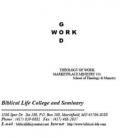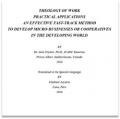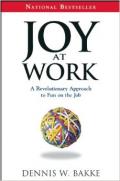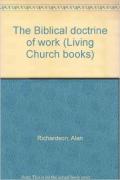Resources
The books listed here are either free to download or can be purchase by going to the link provided. All documents are free to download.
Click on the + sign next to the title to find the links to download or purchase.
| Title & Author | Language | Links | Tags | |
|---|---|---|---|---|
| God and Work - Theology of work - Marketplace Ministry 101 by John Fryters |
 Book Description: This is a curriculum of Theology of Work and Marketplace Ministry developed by Dr. John Fryters for the Indigenous People.
ISBN # 9781626970267
This book is free to download. Comments from those who download would be appreciated. Pastor John Fryters can be reached at campus@inet2000.com |
English | Download this curriculum | |
| Why Living Sent Matters by Jerry Moll |
Document Description: "Why Living Sent Matters" is Rev. Jerry Moll's paper for Overture I: Fresno course (BGU course). This article will help us understand how studying the city of Fresno California helped Living Sent Ministries sees city transformation as an achievable outcome of their marketplace ministry. |
English | Download and read this article | |
| Bono on Capitalism with a Conscience by Rodolpho Carrasco |
This article was published in Prism Magazine, August 12, 2025
'In June, U2 frontman Bono made ripples across evangelical America with aninterview with Focus on the Family’s Jim Daly. In the interview Bono affirmed his Christian faith, reciting a stream of biblical quotes along with his own commentary and applications to daily life. At one point he clearly stated, “I believe that Jesus was the Son of God.”'... |
English | Read Full Article | |
|
Christian Investors Get Patient With Their Capital by Rodolpho Carrasco and Rob Moll |
This is an article published in Forbes, Nov. 2012.
"Christian investment vehicles have always struggled. When the FaithShares ETF launched in December 2009, it was to significant press. The founders rang the opening bell on the floor of the New York Stock Exchange, and the Christian and secular press covered their launch. The funds allowed retail investors to put money into stocks based on the recommendations of their denominations. Baptists could avoid liquor while Methodists could avoid gambling profits. However, 18 months after the high-profile launch, FaithShares went defunct..."
|
English | Read Full Article |
| Title & Author | Language | Links | Tags | |
|---|---|---|---|---|
| Theology of Work - Practical Applications (English) by John Fryters |
 Book Description: An effective fast track method to develop micro-businesses or cooperatives in the developing work. This book is a curriculum developed by Dr. John Fryters combining Theology of work with business & finance training and small micro loans provision. It is also available in Spanish. This book is free to download. Comments from those who download would be appreciated. Pastor John Fryters can be reached at campus@inet2000.com |
English | Download this book | |
| Joy at Work: A Revolutionary Approach To Fun on the Job by Dennis Bakke |
 Book Description: Imagine a company where people love coming to work and are highly productive on a daily basis. Imagine a company whose top executives, in a quest to create the most "fun" workplace ever, obliterate labor-management divisions and push decision-making responsibility down to the plant floor. Could such a company compete in today's bottom-line corporate world? Could it even turn a profit? Well, imagine no more. In Joy at Work, Dennis W. Bakke tells the true story of this extraordinary company--and how, as its co-founder and longtime CEO, he challenged the business establishment with revolutionary ideas that could remake America's organizations. It is the story of AES, whose business model and operating ethos -"let's have fun"-were conceived during a 90-minute car ride from Annapolis, Maryland, to Washington, D.C. In the next two decades, it became a worldwide energy giant with 40,000 employees in 31 countries and revenues of $8.6 billion. It's a remarkable tale told by a remarkable man: Bakke, a farm boy who was shaped by his religious faith, his years at Harvard Business School, and his experience working for the Federal Energy Administration. He rejects workplace drudgery as a noxious remnant of the Industrial Revolution. He believes work should be fun, and at AES he set out to prove it could be. Bakke sought not the empty "fun" of the Friday beer blast but the joy of a workplace where every person, from custodian to CEO, has the power to use his or her God-given talents free of needless corporate bureaucracy. In Joy at Work, Bakke tells how he helped create a company where every decision made at the top was lamented as a lost chance to delegate responsibility--and where all employees were encouraged to take the "game-winning shot," even when it wasn't a slam-dunk. Perhaps Bakke's most radical stand was his struggle to break the stranglehold of "creating shareholder value" on the corporate mind-set and replace it with more timeless values: integrity, fairness, social responsibility, and a sense of fun. |
English | Free to Download | |
| Questions of Business Life by Richard Higginson |
 Book Description: Many important questions of life concern business. But too often they are left unanswered. Richard Higginson concentrates on the tough and complex issues that confront business people in their everyday circumstances. Practical, plausible and definitely thought-provoking, Questions of Business Life explores the interconnection between faith, values and business practice to offer the Christian alternative of 'doing business'. What is the Christian perspective on business and business issues, such as the ethics of marketing, tackling corruption or sustainable development? How can we incorporate faith in business, and what does it mean for the Christian to 'do' business corporately, globally and individually? Based on seminars run by the Ridley Hall Foundation, this shows that Christianity does have a constructive contribution to make in today's commercial and industrial world. Practical, plausible and definitely thought-provoking, Questions of Business Life explores the interconnections between faith, values and practice to offer the Christian alternative to doing business. |
English | Free to Download | |
| The Biblical Doctrine of Work by Alan Richardson |
 Book Description:
|
English | Free to Download | |
|
Muhutasari wa Utendaji wa Theologia ya Kazi by R. Paul Stevens & Samuel Maduma [translated by Samuel Maduma] |
Document Description: MUHUTASARI WA UTENDAJI WA THEOLOGIA YA KAZI is the Swahili version of Theology of Work - Executive Summary by Dr. Paul Stevens, translated by Rev. Samuel Maduma MUHUTASARI WA MAFUNDISHO YA THEOLOGIA YA KAZI Miongoni mwa changamoto zinazotukabili katika kuwaweka pamoja na kuwahudumia watu katika maeneo yao ya kazi ni upungufu wa uelewa wa mafundisho ya Theologia ya kazi. Upungufu huu wa mafundisho kwa ujumla wake unasababishwa na uelewa mdogo wa theologia ya uumbaji, ukombozi na theologia ya mambo ya mwisho (eskatolojia) Mungu mfanyakazi Mungu siyo tu mwanzilishi wa kazi bali yeye alikuwa mfanyakazi (Mw 1, 2; Yoh 5:17, Uf 21:5. Tunaposoma Biblia kuanzia mwanzo hadi ufunuo tunamuona Mungu katika taswira tofautitofauti zinazomuonyesha kama mfanyakazi katika nyanja mbalimbali: Mungu anaonekana kama mchungaji (Zab 23), mfinyanzi (Yer 18:6) Daktari (Math 8:16), Mwalimu (Zab 143:10), Mkulima (Isa 5:1-7) na kadhalika. Mungu anaendelea kufanya kazi hata sasa; anaumba, anatunza, anaokoa na kuendeleza uumbaji wake kama vile alivyofanya takribani miaka bilioni tano ya nuru iliyopita tangu ulimwengu ulipoanza. |
Swahili | Download full article (.docx) | |
| God and Work - Theology of work - Marketplace Ministry 101 by John Fryters |
 Book Description: This is a curriculum of Theology of Work and Marketplace Ministry developed by Dr. John Fryters for the Indigenous People.
ISBN # 9781626970267
This book is free to download. Comments from those who download would be appreciated. Pastor John Fryters can be reached at campus@inet2000.com |
English | Download this curriculum |
